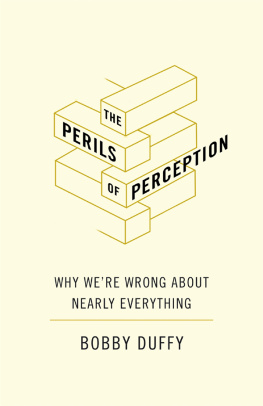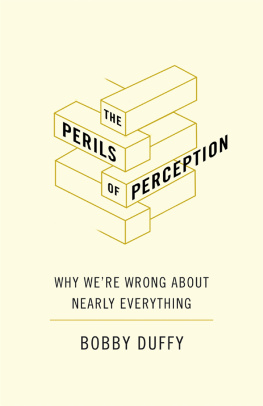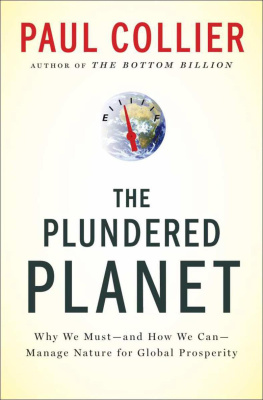Contents
Guide

Interesting and well-informed. Duffy is a voice of calm reason amid all our anxieties about a post-truth world.
Lord David Willetts Executive Chair of the Resolution Foundation
A great read that will help you get a better fix on reality. This book will help you understand why many of the things you think are probably wrong.
Hetan Shah Executive Director, The Royal Statistical Society
Fantastic: there are eye-opening and shocking statistics on every page. The Perils of Perception may force you to reconsider your most deeply held views.
Jamie Bartlett author ofThe People Vs Tech
An essential read. This book lays bare the struggle and pitfalls faced by opinion formers and policy makers alike if they are to inform policy on the basis of facts rather than perceptions.
Alberto Nardelli Europe Editor, BuzzFeed News
To Bridget and Martha,
who I know will cost me a lot more
than 458,000.
First published in hardback in Great Britain in 2018 by Atlantic Books, an imprint of Atlantic Books Ltd.
Copyright Bobby Duffy, 2018
The moral right of Bobby Duffy to be identified as the author of this work has been asserted by him in accordance with the Copyright, Designs and Patents Act of 1988.
All rights reserved. No part of this publication may be reproduced, stored in a retrieval system, or transmitted in any form or by any means, electronic, mechanical, photocopying, recording, or otherwise, without the prior permission of both the copyright owner and the above publisher of this book.
1 2 3 4 5 6 7 8 9
A CIP catalogue record for this book is available
from the British Library.
E-book ISBN: 978 1 78649 457 3
Hardback ISBN: 978 1 78649 456 6
Printed in Great Britain
Atlantic Books
An Imprint of Atlantic Books Ltd Ormond House
2627 Boswell Street
London
WC1N 3JZ
www.atlantic-books.co.uk
All figure sources and data are available from www.perils.ipsos.com except the following:
Trends in birth rates per 1000 females aged 1519 by ethnicity in the US (
Do you feel closer to a particular party than all other parties? (): European Social Survey 20022016
Key moves in public trust over time (): Ipsos MORI Veracity Index
Contents
Introduction
Perils Everywhere
I hated my psychology classes at college. As I remember them now, they were taught by a succession of super-smart, suave professors with identikit looks, closer to snake-hipped rock stars than fusty academics. They were all tall and slim, with haircuts that didnt play by professorial rules. They wore all-black clothes or, at a push, paisley shirts, and shoes that were just that bit too pointy. (I admit, jealousy may be clouding my own perceptions a little; in fact, I think Ive just described Russell Brand.) The students, of both genders, swooned not so much because of the professors rebellious looks, but because they seemed to know so much about how we thought. Theres nothing more attractive to most confused young adults than someone who really understands them.
But I had a problem with that. I hated the cognitive tricks that proved we nearly all fall into the same mistaken ways of thinking. Theyd set us up with questions or experiments that were custom-made to elicit a particular answer and show how typical our brains were. At that insecure but arrogant age, I wanted to be special and unpredictable but my answers were just like everybody elses.
Take this example, from a professor at the University of Maryland:
You have the opportunity to earn some extra credit on your final grade. Select whether you want two points or six points added onto your final paper grade. But theres a small catch: if more than 10 per cent of the class selects six points, then no one gets any points, not even the people who chose two points.
Here is a very direct and teachable moment, a lesson in the tragedy of the commons where individuals try to obtain the greatest benefit from a particular resource, taking more than their equal or sustainable share, and therefore ruin it for everyone, including themselves. Of course, the class conformed to type, and failed. Around 20 per cent selected six points, so they all got nothing. In fact, only one class in one semester over the eight years the professor had been conducting his mildly cruel experiment had actually managed to get the extra credits.
Given my lingering sensitivity to psychological tricks, its not without irony that a lot of my working life has been focused on running similar tests. Ive spent the last twenty years at opinion research firm Ipsos MORI, designing and dissecting research from around the world to help understand what people think and do, and why. For the last ten years Ive run hundreds of surveys on public misperceptions what we call the Perils of Perception investigating a range of social and political issues, from sexual behaviour to personal finance, across a large number of countries. We now have over 100,000 interviews, across forty countries on some questions, allowing us to weigh up our perceptions against reality. This is a unique and fascinating source of data on how we see the world, and why were often so wrong: previous work has tended to focus on one issue or sphere of life, and few get beyond a handful of countries. You can dig into the full set of Ipsos studies at: www.perils.ipsos.com
Across all the studies and in every country, people get a lot wrong on nearly every subject weve covered, including immigration levels, teen pregnancy, crime rates, obesity, trends in global poverty and how many of us are on Facebook. But the key question is Why?.
Lets start off with a question thats got very little to do with the sort of social and political realities well look at later, but helps to highlight why there might be this gap between perceptions and reality: Is the Great Wall of China visible from outer space? What do you think? If youre anything like the population in general, there was about a 5050 chance that you answered yes, as surveys show that half of people say they believe the Great Wall is visible from space. Theyre wrong its not.
At its widest, the Great Wall is only nine metres across, about the size of a small house. Its also built of rock that is similar in colour to the surrounding mountains, so it blends in with the landscape. When you take a bit of time to think about it, the idea that the Great Wall is visible from space is actually slightly ridiculous, but there are some very good reasons why you might have thought it is.
First, its not something youll have pondered on a lot. Unlike me, you probably havent looked up the width of the Wall or its distance from outer space (and then got caught up in endless forum discussions about the claim). You dont have the pertinent facts readily available to you.
Second, you may have vaguely heard someone say it when you werent paying much attention. You may even have seen it in print or heard it on the television. For years, Trivial Pursuit had it as an (incorrect) answer. Youre less likely to have seen it in Chinese school textbooks, but its still noted as a fact in those. However, youve likely seen it somewhere and havent seen anything to contradict the assertion, so it settled in your head.













